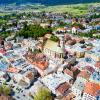
IIASA researchers contributed to a discussion on the ways in which systems analysis and complexity economics can support public sector policies with new computational technologies and analytical tools toward targeted governance of platform markets, data-based activities, and complex societies.
Advancements in computational technologies including Artificial Intelligence, Machine Learning, and Deep Learning have widely proliferated the growth of the most prominent actors in the digital platform economy. Some experts believe that a deeper dissemination of computational techniques into public governance, policies, regulatory enforcements hold high promise for ensuring adequacy of regulatory tools in increasingly complex economies.
On 24 May 2021, Elena Rovenskaya contributed to the virtual conference titled “The Promise of Computational Competition Law and Economics”, organized by the BRICS Competition Law and Policy Center and Hellenic Competition Commission, and supported by the Journal of Competition Law and Economics. Rovenskaya presented on ASA’s recent explorations of agent-based modelling (ABM) techniques in the forecasting of macroeconomics and for analyzing resiliencies of national economies to endogenous crises and external shocks.
Her presentation highlighted the underperformances of existing macroeconomic models during economic abnormalities, and the promising techniques of ABM in modelling non-equilibrium behaviors of heterogenous agents to develop reliable forecasts of the consequences of macroeconomic perturbations using a bottom-up approach. Her presentation is in line with the research of ASA’s Exploratory Modelling of Human-natural Systems (EM) research group which focuses on the development of integrative models of different complexity to better understand complex feedbacks in human-natural systems, led by Sebastian Poledna.
The conference also elaborated on the obstacles faced by competition and anti-monopoly regulators in incorporating computational techniques into existing law enforcements and investigatory processes. Here, Rovenskaya also referred to the potential possibilities of ABM in mapping the behaviors of highly interconnected digital business ecosystems and its usefulness in informing the next generation of ex-ante competition policy frameworks.
The event brought together competition policy-advisors and experts including Ioannis Lianos, President of the Hellenic Competition Commission, Yann Guthmann, Head of the Digital Economic Unit at the French Competition Authority, and Pierre Regibeau, Chief Economist, European Commission. Among present were also academics from Stanford University, University College London, and Utrecht University.
To read more on the event and watch the live stream, click here.
To read the BRICS Competition Law and Policy Center and the Hellenic Competition Commission Inception Report on Computational Competition Law and Economics, click here.
To find out more about the EM group and ASA’s other activities, click here.
News

11 March 2025
IIASA provides insights on research, technology, and innovation to Austrian federal states

06 March 2025
IIASA’s CAT Research Group joined the UN ECOSOC Partnership Forum 2025’s event: Global Challenges Action Innovation, Emerging Technologies & the Power of Partnerships

14 February 2025

